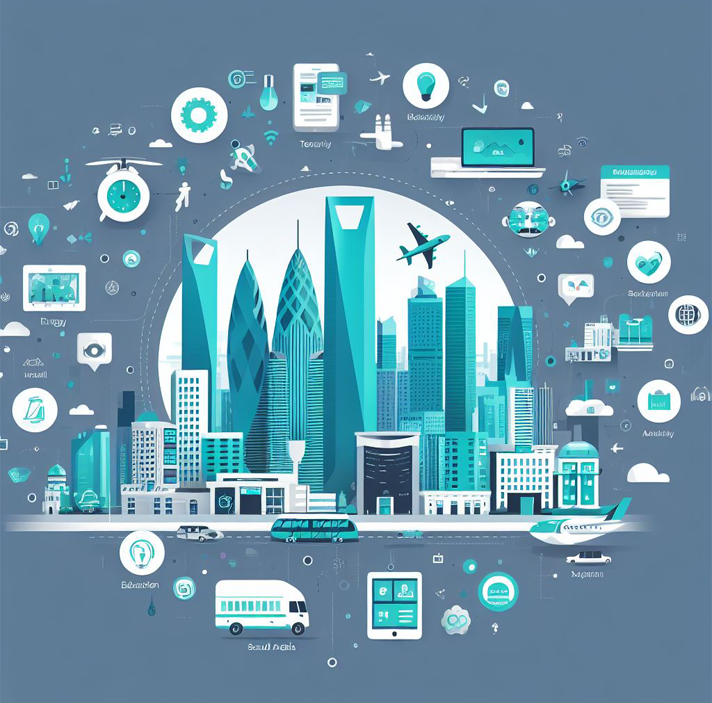
Smart cities are cities equipped with information and communication technologies (ICT) and modern innovations, aiming to improve the quality of life for their residents and enhance the efficiency of government services and infrastructure. Smart cities are characterized by the effective use of data, analytics, and technology to enhance the resident experience and promote sustainability and efficiency.
Content of article
- Definition of Smart Cities
- Components of Smart Cities
- Benefits of Smart Cities
- Goals of Smart Cities include:
- Challenges and Future Developments
- Experts Vision Consulting: Leaders in Smart City Solutions
- Providing Information Technology Consultations:
- Data Analysis and Artificial Intelligence:
- Designing and Implementing Cybersecurity Solutions:
- Developing Smartphone Applications and Electronic Platforms:
- Developing Smart Transportation Systems:
- Promoting Energy and Environmental Sustainability:
- Guiding Policies and Strategic Planning:
Definition of Smart Cities
Smart cities are cities that use advanced technology and data to improve the lives of their residents and facilitate access to public services. They rely on smart infrastructure that integrates devices, objects, and information to connect all parts of the city with each other.
Components of Smart Cities
To achieve this comprehensive definition, smart cities rely on several key components:
- Technological Infrastructure: This includes the use of technology to enhance urban infrastructure, such as using the Internet of Things (IoT) and wireless networks to improve communication and facilities.
- Smart Communications: Smart communication technologies enable the connection of devices and individuals within the city, facilitating the exchange of information and more efficient resource management.
- Smart Management: The use of big data analytics and artificial intelligence is essential for better city management, making government decision-making more accessible and contributing to sustainable development.
Benefits of Smart Cities
Smart cities offer a range of tremendous benefits to their residents and the environment, including:

- Improved Quality of Life: Providing public services with better quality and easier accessibility.
- Sustainability and Environmental Preservation: Reducing resource consumption and harmful emissions to protect the environment.
- Economic Development: Promoting economic growth through business support, attracting investments, and enhancing innovation.
- Community Participation: Encouraging active community participation in city management and sustainable decision-making.
Goals of Smart Cities include:
- Achieving greater well-being for residents.
- Environmental sustainability.
- Enhancing community participation.
- Promoting safety and security.
- Fostering economic growth.
Challenges and Future Developments
Despite the significant benefits of smart cities, there are also challenges, such as privacy issues, cybersecurity concerns, and costs. However, ongoing technological advancements in smart cities are expected to help us overcome these challenges and improve our future.
Experts Vision Consulting: Leaders in Smart City Solutions
Experts Vision Consulting is among the leading companies worldwide in providing artificial intelligence and smart technology solutions. They excel in delivering a diverse range of services that meet the needs of smart cities and enhance the daily lives of their residents.
Key services include:
Providing Information Technology Consultations:
- The company assists in identifying and implementing the latest technologies and solutions in the field of information technology to enhance the performance of infrastructure and promote interaction among the components of the smart city.
Data Analysis and Artificial Intelligence:
- It helps in collecting and analyzing big data to provide insightful insights into the city’s performance and needs, enabling local authorities to make better data-driven decisions.
Designing and Implementing Cybersecurity Solutions:
- Offering consultations on securing the technological infrastructure in the smart city, including protecting sensitive systems and data from cyber threats.
Developing Smartphone Applications and Electronic Platforms:
- Working on designing and implementing smartphone applications and electronic platforms that facilitate the lives of citizens and improve their interaction with government services.
Developing Smart Transportation Systems:
- Contributing to improving public transportation and encouraging the use of smart transportation methods to enhance traffic flow and reduce congestion.
Promoting Energy and Environmental Sustainability:
- Providing technological solutions to improve energy efficiency and enhance environmental sustainability projects in the city.
Guiding Policies and Strategic Planning:
- Offering consultations to help formulate policies and strategies to achieve the transition to a smart city, with a focus on achieving sustainable development goals.